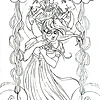I seem to write about musicians a lot. Moth and Mikki and Deyandara in the Gods of the Caravan Road series, Rookfeather in the Torrie books, Thomas Smith Gorev and his band in Love/Rock/Compost, Eleanor in Treason in Eswy, and the various minstrels and harpers in The Serpent Bride, a collection of short stories based …
I seem to write about musicians a lot. Moth and Mikki and Deyandara in the Gods of the Caravan Road series, Rookfeather in the Torrie books, Thomas Smith Gorev and his band in Love/Rock/Compost, Eleanor in Treason in Eswy, and the various minstrels and harpers in The Serpent Bride, a collection of short stories based on medieval Danish ballads, are all singers and storytellers in one form or another. Most of them, too, are wanderers. It’s an idea that has always had a lot of imaginative appeal for me. In The Wolf and the Wild King, one of the two main characters, Lannesk, though a warrior and an outlaw on the run, is at heart a harper and a singer, despite having lost his voice following a brutal injury when he was a boy. The other main character, Mairran, troubled son, assassin and executioner in service to the nameless and undying Queen, spends what time he can steal for it with an olive-wood flute, chasing an elusive music with which he can’t quite get to grips, but which he feels some need to understand. Another central character is the Wild King, who was once a mortal Singer; his harp and his song are a part of his magic and the means whereby he and the Grey Hunter bound the dragon Erryth the Golden beneath the Lake in the legendary past. There are other characters — Singers, to use the Forest term for the bards trained in the history and lore of the Forest lands, and mere Outlander minstrels — for whom music is central, and nearly everyone will take a turn with the harp and a song around the fire on a winter’s night.
Stories and song, poetry and music, are more closely related, historically, than we often remember. The story itself might be a poem, structured by alliteration or rhyme (Beowulf in Old English and the Middle English Alliterative and Stanzaic Mortes, for instance, or the ballads that people went on singing from medieval times right on into the era of the folklorists of the nineteenth century and the folk musicians of the twentieth) or it might include smaller verses, songs, or riddles cast in verse. Think of how many fairy tales, even ones in translation, include some scrap of rhyme. “Name me name me not, my name is Tom Tit Tot …” or “Mirror, mirror on the wall …”. Tolkien in particular brought this mode of telling a story, the main narrative woven through with poetry and song, into the modern (or Modern) novel of the twentieth century. Until the advent of good sound recording and reproduction, say the mid-twentieth century, people sang and recited and made music themselves much more than we do now, and when writing about a culture lacking that technology, we tend to forget how common a part of life singing, reciting, and the making of music was. Though I have always written characters who are musicians and poets, in The Wolf and the Wild King, for all that it is a story well-filled with battle, ambush, desperate deeds in the dark and, to use Buchan’s phrase, “Escapes and Hurried Journeys,” I wanted to show that presence of music and poetry as something more ubiquitous, an everyday part of life, not only an art purveyed by those who make it the centre of their lives and their means of earning their bread. I had in mind the story of Cædmon, the servant at the abbey of Whitby in the seventh century, who, lacking skill in music and poetry, never took part when the others were passing around the harp and making verses in the evening; he mourned for this lack in himself. An angelic visitation gives him the gift, either of talent or confidence; he composes a hymn in Old English and is able to join in the singing and music-making thereafter with his fellows; more importantly, he becomes, through Bede’s recording of the story, a demonstration that the vernacular can be used for divine purposes and thus to write holy things in Old English rather than Latin is an acceptable act. It was not the Cædmon story’s elevation of the vernacular to a language fit for sacred use (and thereby worthy of being written down), but the frame of his story, the everyday pastime of the unlettered servants of the abbey passing around a harp and jamming, making music and poetry together, that I wanted to carry into this new book, showing a culture where music is something everyone is likely to take part in, not only as a listener, but by playing an instrument, reciting a tale, or partaking in communal dancing and ballad-singing.
On another level, when writing about a culture not dominated by the written word, the musician and oral poet can stand in for the writer and for those who, like them, use words as their tools of making. They can convey something of what the act of writing means for the writer. Words and music have the power to shape a thought, to give birth to an emotion, to sway an intent. Words and music are powerful. Words and music are magic. In The Wolf and the Wild King, the characters I write about as musicians are those who can make music and songs out of, you might think, nothing — creating on the fly a song or a spell. This skill comes out of long study of the making of music and the recitation of songs and lays, for the Singers who have served their three- or the greater seven-year apprenticeship; for those, like Lannesk, who have not followed that path of dedicated study, the making is nonetheless a skill grown out of a talent, an affinity for the art, honed by long practise and use, by listening, by learning to understand what is heard. The magic in the world (at least the magic within human grasp that is not a Forest-blessing inherent from birth), is the same; it is not a magic of formulae and rules, but like a talent for music, is something perhaps innate in some people, but which can be developed and trained to some degree even in someone who has no obvious talent. It will always run stronger in someone already disposed that way, someone with a good ear and the passion (and opportunity) to devote themselves to it. Lannesk, outlaw warrior though he is, was born to make music, and in the loss of his voice, his skill with the Forest-harp becomes one of the most vital ways he has to examine his own feelings and to share fellowship with his companions (even when it means playing that one wretched ballad yet again for someone who insists on singing off-key). Mairran is haunted by something he cannot get to grips with; he tries to shape it in music, not with any notable success, but still he hears it and tries to give it form. Lannesk’s music, all untrained, turns to magic when he shapes it to serve that need, a defence against the dragon-kin sorcerers, a weapon with which he can fight the working of their spells, which themselves are shaped and given power by song and sacrifice. The Wild King himself makes magic with harp and song great enough to bind a dragon — for a time.
Those harps, by the way, are not the Celtic harp that many of you are probably picturing. That’s a later instrument. The harp of Cædmon, in Old English, hearpe, and in Old Norse, harpa, is now called a lyre, because later musicologists decided to take the Greek lyre as the defining word for instruments with a frame and strings parallel to the soundboard; they relegated “harp” to ones with a frame where the strings are perpendicular to it. The Northern/Germanic/Anglo-Saxon lyre, though is a harp — the harp, in fact. That’s the instrument that the word originally meant; that’s what Cædmon played; that’s the instrument played by the Wild King, and by Lannesk, when he can get his hands on one. Even Mairran, though his preferred instrument is the flute (i.e. the recorder, not a transverse flute) can take a turn at the harp when it’s being passed around of an evening.
Whatever the instrument played, that longing to have words, to have notes and chords of power to make music out of nothing and to shape the world, is a powerful emotion in Lannesk and also in Mairran, who wants nothing more out of it than to grapple with his own elusive understanding of himself. Maybe this was born out of my own yearning to be able to play with the freedom I attribute to Lannesk. I’m a dogged, technical guitar player. I began playing when I was nine and so have been playing classical guitar most of my life (taking to electric guitar and bass more recently), but still, after all these years, I can no more pick up a guitar and have spontaneous music spill out of it or me than I can fly. I would liken it to flying, in fact. When I get too glum about that failure, I remind myself that I may be no musician, but I write novels in vast worlds spanning many characters and cultures and times and I weave them all together across a series without an outline, throwing threads in the air and catching them to weave back in three books later — and they fly. And the words I write sing. So I do magic too — just not with a guitar. (Unlike Cædmon, or Tolkien, I haven’t quite summoned up the courage to write poetry for Lannesk or the Wild King to give you, only scraps that are more an impressionistic paraphrase than any kind of verse.) There is magic in words well-set; even in prose, there can be music.
An afterword on northern lyres:
You can look at some beautiful northern lyre reproductions on the website of luthier Michael J. King; I think the Trossingen lyre is my favourite. If you read German, the German Wikipedia has a very good, detailed article on it. There are also quite a few recordings and videos of various reproductions played by various musicians online. I am, in fact, struggling with the urge to try to build one myself. (As research, of course.) You can even buy a book of sheet music for the northern lyre, Norþhærpe: How to Play Anglo-Saxon, Viking & Germanic Lyres, by Paul Wilding (isbn: 9798784254818).
My website page about The Wolf and the Wild King
Purchase links for the ebook — links to buy the paperback edition aren’t available yet.
Links for further reading on the northern lyre, i.e., the forest-harps of The Wolf and the Wild King, as well as some videos:
Anglo-Saxon lyres Michael J. King
K.V. Johansen is the author of the five-book epic fantasy series Gods of the Caravan Road, beginning with the Sunburst-shortlisted Blackdog, as well as a number of books for children and teens and two works on the history of children’s fantasy literature. She has an M.A. from the Centre for Medieval Studies at the University of Toronto and is a member of the SFWA and the Writers’ Union of Canada. Various of her books have been translated into French, Macedonian, and Danish. As Kris Jamison, she is the author of the novel Love/Rock/Compost. Her website can be found at www.kvj.ca and she is on BlueSky as @kvjohansen. She lives in New Brunswick, Canada.











